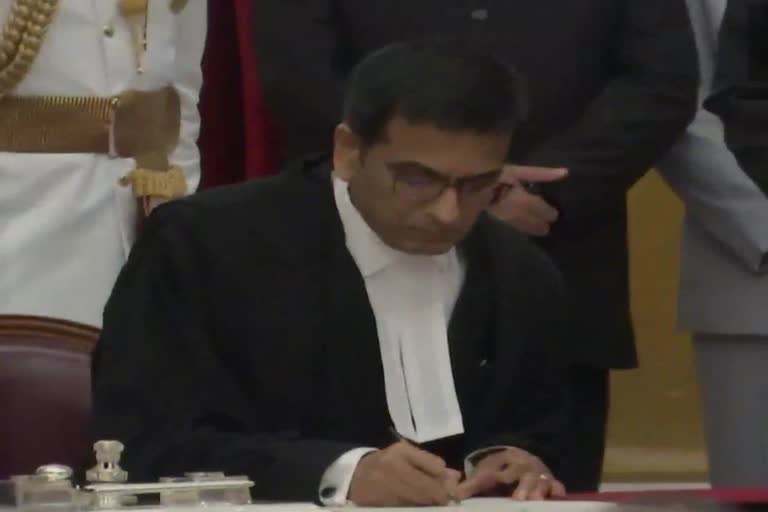New Delhi: Justice Dhananjaya Yashwant Chandrachud was sworn in as the 50th Chief Justice of India (CJI) on Wednesday. President Droupadi Murmu administered the oath at a brief ceremony held at the Rashtrapati Bhavan. Justice Chandrachud takes over as the head of India's judiciary from Justice Uday Umesh Lalit, who demitted office on Tuesday.
His illustrious father Y V Chandrachud was the country's longest-serving CJI and remained at the helm from February 22, 1978, to July 11, 1985. Now, exactly after 44 years, Justice Chandrachud will serve as the CJI. He will hold office for two years till November 10, 2024, as Supreme Court judges retire at the age of 65.
Justice Chandrachud succeeds Justice U U Lalit, who had recommended the former as his successor in a communication to the Centre on October 11. President Droupadi Murmu appointed him as the next CJI on October 17. Justice Chandrachud, born on November 11, 1959, was elevated to the top court on May 13, 2016.
He has been part of several Constitution benches and landmark verdicts of the top court including on matters relating to the Ayodhya land dispute and the right to privacy and adultery. Justice Chandrachud was also part of the benches which delivered path-breaking judgements on decriminalising same-sex relations, partial striking down of Section 377 of the IPC, the validity of the Aadhaar scheme and the Sabarimala issue.
Recently, a bench headed by him expanded the scope of the Medical Termination of Pregnancy (MTP) Act and the corresponding rules to include unmarried women for abortion between 20-24 weeks of pregnancy. The Justice Chandrachud-led bench had also passed several directions to assuage the miseries faced by people during the COVID-19 crisis and termed the brutal second wave of the pandemic last year as a "national crisis".
Recently, Justice Chandrachud was among the two judges of the apex court's Collegium which had objected to the method of "circulation" adopted for eliciting the views of its members on the appointment of judges to the top court. He was a judge of the Bombay High Court from March 29, 2000 until his appointment as the Chief Justice of the Allahabad High Court on October 31, 2013.
Justice Chandrachud was designated as a senior advocate by the Bombay High Court in June 1998 and became Additional Solicitor General in the same year till his appointment as a judge. After completing his BA with Honours in Economics from St Stephen's College, New Delhi, Justice Chandrachud did his LLB from Campus Law Centre, Delhi University, and obtained an LLM degree and a Doctorate in Juridical Sciences (SJD) from Harvard Law School, USA.
He practised law at the Supreme Court and the Bombay High Court and was a visiting professor of comparative Constitutional law at the University of Mumbai.



